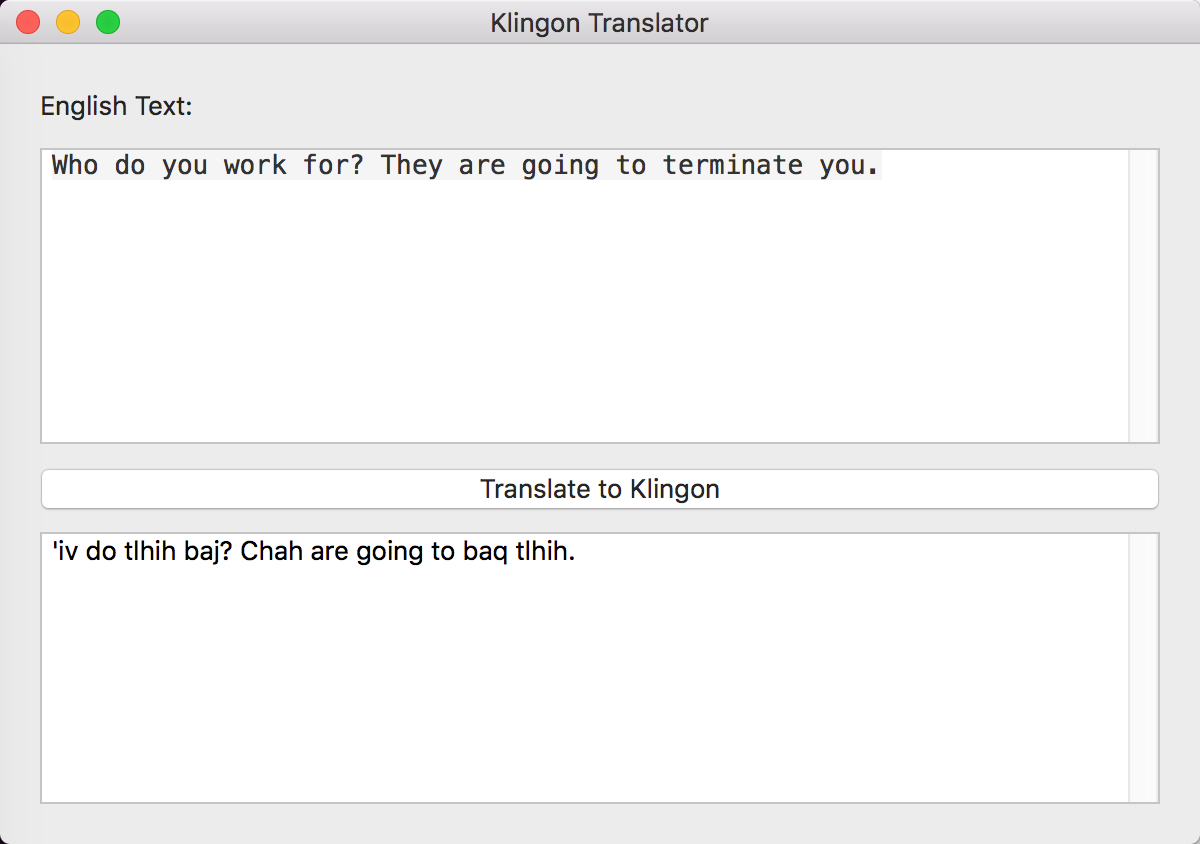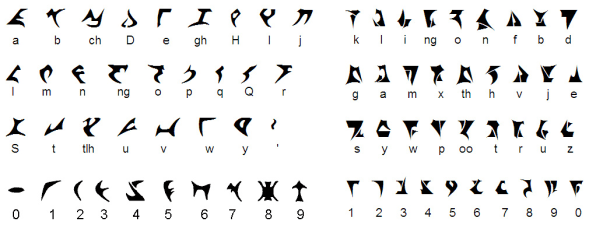Topic translate klingon to english: Dive into the fascinating world of interstellar communication with our guide on how to translate Klingon to English, bridging cultures from different corners of the galaxy.
Table of Content
- How do I translate Klingon to English?
- Best Tools and Websites for Klingon to English Translation
- Understanding Klingon: Grammar, Vocabulary, and Usage
- History and Development of the Klingon Language
- How to Learn Klingon: Resources and Tips
- Common Challenges in Translating Klingon and How to Overcome Them
- Cultural Significance of Klingon in Star Trek and Beyond
- YOUTUBE: Klingon vs Ubbi Dubbi - The Big Bang Theory S10E07
- Comparing Klingon Translation Tools: Accuracy and Reliability
- Practical Applications of Klingon: From Entertainment to Education
- User Reviews and Recommendations on Klingon Translation Services
- Future of Klingon Language: Trends and Innovations
How do I translate Klingon to English?
To translate Klingon to English, you can follow these steps:
- Open a web browser on your device.
- Go to a reliable translation website like Translate.com.
- On the translation website\'s homepage, locate the input field or search bar.
- Type or paste the Klingon text you want to translate into the input field.
- Choose the source language as Klingon and the target language as English.
- Click on the \"Translate\" or \"Submit\" button to initiate the translation process.
- Wait for the translation to be processed.
- Once the translation is complete, the translated text in English will be displayed on the website.
Alternatively, you can use other language translation tools available online. It\'s important to note that Klingon is a fictional language created for the Star Trek series, so the accuracy and availability of translations may vary.
READ MORE:
Best Tools and Websites for Klingon to English Translation
Exploring the universe of Star Trek\"s Klingon language has never been easier, thanks to a plethora of tools and websites dedicated to translating Klingon to English. Whether you\"re a fan seeking to understand Klingon phrases or a linguist diving into constructed languages, these resources offer comprehensive solutions for all your translation needs.
- Funtranslations Klingon Translator: Offers instant translations of phrases from English to Klingon and vice versa, perfect for quick look-ups and fun translations.
- Translator.eu: A versatile tool that supports translations between English and Klingon, providing insights into grammar and cultural context.
- dCode: Specializes in encoding and decoding Klingon script, making it a unique resource for understanding the written aspects of the language.
- Omniglot: Provides detailed information on the Klingon alphabet and pronunciation, ideal for learners focusing on the linguistic structure.
- Glosbe English-Klingon Dictionary: An extensive dictionary that offers translations, definitions, and examples of usage, facilitating deeper learning.
- Tradukka: Offers real-time translation from Klingon to English, equipped with definitions to enhance understanding.
- ImTranslator: Provides instant translations, text-to-speech services, and translation dictionaries for comprehensive learning experiences.
- Klingonska Akademien\"s Pocket Dictionary: A valuable resource for serious learners, offering a detailed Klingon-English and English-Klingon dictionary.
- Bing Translator: Features a Klingon translation option developed with input from Marc Okrand, the creator of the Klingon language, ensuring high accuracy and reliability.
These tools not only facilitate Klingon to English translation but also offer a window into the rich culture and intricate grammar of the Klingon language, making the learning process engaging and effective.

Understanding Klingon: Grammar, Vocabulary, and Usage
Klingon, or tlhIngan Hol in its native script, is not just a fictional language from the Star Trek universe but a rich, complex language with its own unique grammar, vocabulary, and usage rules. Mastering Klingon offers a window into the warrior culture of the Klingons, reflecting their values, philosophy, and way of life.
- Grammar: Klingon syntax is object-verb-subject (OVS), a rare arrangement among Earth\"s languages. This structure places the object at the beginning of the sentence, followed by the verb and subject, challenging English speakers to think differently about sentence construction.
- Vocabulary: The Klingon lexicon is heavily influenced by the culture\"s focus on war, honor, and space travel, with numerous terms for weapons, ship parts, and battle tactics. However, it also includes words for everyday activities and emotions, illustrating the language\"s depth.
- Pronunciation: Klingon sounds include guttural stops and sounds not found in many Earth languages, making pronunciation a challenge for learners. Mastery requires practice and a good ear for these distinctive sounds.
- Usage: Beyond its grammatical structure and vocabulary, using Klingon correctly involves understanding the cultural context in which words are used. Phrases and expressions often carry connotations related to Klingon honor, tradition, and social hierarchy.
- Learning Resources: Resources for learning Klingon include online courses, dictionaries, and apps designed to teach the language from the ground up. Engaging with the Klingon-speaking community and participating in forums can also enhance understanding and fluency.
Understanding Klingon grammar, vocabulary, and usage is not only an exercise in language learning but also an exploration of a culture that, while fictional, offers rich insights into the nature of communication, identity, and social structure.
History and Development of the Klingon Language

How to Learn Klingon: Resources and Tips
Learning Klingon, the language of the warriors of Star Trek, is a fascinating journey into linguistics and culture. Whether you\"re a fan looking to immerse yourself deeper into the Star Trek universe or a language enthusiast curious about constructed languages, here are resources and tips to guide your learning path.
- Start with The Klingon Dictionary: Written by Marc Okrand, the linguist who developed Klingon, this book is the definitive guide to the language, including grammar rules, vocabulary, and usage examples.
- Use Online Translators: Websites like Bing Translator and Funtranslations offer Klingon translation services, which are great for practicing and seeing instant translations of words and phrases.
- Join the Klingon Language Institute (KLI): This organization offers resources, courses, and a community for learners at all levels. They also host qep\"a\" (annual gatherings) where enthusiasts can immerse themselves in the language and culture.
- Practice with Apps: Language learning apps like Duolingo have introduced Klingon courses, making it easy and fun to learn the language at your own pace.
- Engage with the Community: Online forums and social media groups are great places to find study partners, get answers to your questions, and practice Klingon with native and fluent speakers.
- Watch Star Trek in Klingon: Some episodes and movies feature Klingon dialogue. Watching them can help you get used to the sound and rhythm of the language.
- Attend Klingon Language Camps: For an immersive experience, consider attending a camp or workshop where you can practice speaking, writing, and living Klingon for a few days.
- Read Klingon Literature: There are books, poetry, and even operas written in Klingon. Reading these can improve your vocabulary and understanding of the culture.
- Practice, Practice, Practice: Like any language, becoming fluent in Klingon requires regular practice. Set aside time each day to study, speak, write, or listen to Klingon.
With dedication and the right resources, learning Klingon can be an enriching experience that opens up a new universe of communication and cultural understanding.

_HOOK_
Common Challenges in Translating Klingon and How to Overcome Them
Translating Klingon to English presents unique challenges, reflecting the complexity and depth of this constructed language. Understanding these challenges is key to effective translation and learning.
- Cultural Context: Klingon phrases often carry cultural nuances that are difficult to translate directly into English. To overcome this, immerse yourself in Klingon culture through Star Trek episodes, movies, and literature to grasp the underlying meanings.
- Grammatical Structure: The object-verb-subject (OVS) order is uncommon in human languages, making sentence construction in Klingon uniquely challenging for English speakers. Practice by constructing simple sentences and gradually increasing complexity.
- Phonetics: Klingon includes sounds not present in English, requiring learners to develop new phonetic skills. Listening to native speakers and practicing pronunciation regularly can help overcome this barrier.
- Vocabulary Gaps: Some concepts in Klingon do not have direct English equivalents, and vice versa. Use creative paraphrasing to convey the essence of such terms, or adopt the Klingon word into your English translation when necessary.
- Idiomatic Expressions: Like any language, Klingon has idioms that lose their meaning when translated literally. Research and consult resources such as the Klingon Language Institute for guidance on idiomatic expressions.
- Learning Resources: The availability of learning and translation resources varies. Engage with online communities, utilize translation tools, and refer to official dictionaries and guides to enhance your understanding and translation accuracy.
By acknowledging these challenges and utilizing available resources, enthusiasts can navigate the complexities of translating Klingon to English, enriching their appreciation for this unique language.
Cultural Significance of Klingon in Star Trek and Beyond
The Klingon language extends far beyond the confines of the Star Trek series, playing a significant role in both pop culture and linguistics. Its creation and evolution reflect the power of constructed languages to influence real-world culture, offering insights into how language shapes identity and community.
- Symbol of Cultural Diversity: In Star Trek, Klingon represents the rich cultural heritage and complex social structures of the Klingon people. It underscores the franchise\"s commitment to exploring diversity and the challenges of intercultural communication.
- Constructed Languages: Klingon is one of the most successful constructed languages, highlighting the creativity and precision involved in language creation. Its development by Marc Okrand has inspired linguists and language enthusiasts to explore the boundaries of artificial languages.
- Community and Identity: The Klingon language has fostered a unique community of speakers and learners worldwide, united by a shared interest in Star Trek and linguistic construction. This community participates in conventions, online forums, and even academic studies, showcasing the language\"s role in forming identity and camaraderie.
- Educational Tool: Learning Klingon is not just a hobby; it serves as an educational tool that offers insights into linguistics, phonetics, and grammar. It challenges learners to think about language structure and use in new ways, promoting a deeper understanding of human communication.
- Literary and Artistic Works: Klingon has been used to translate works of Shakespeare and other literary classics, demonstrating its versatility and cultural reach. These translations and original Klingon works contribute to a growing body of literature that enriches the language\"s lore.
- Global Influence: The global fascination with Klingon reflects the enduring appeal of Star Trek and the power of popular culture to shape language and communication. It illustrates how a fictional language can have real-world applications and cultural significance.
The cultural significance of Klingon extends beyond its origins in Star Trek, influencing linguistics, education, and community building. Its development and continued use highlight the enduring fascination with language and the ways it can bridge worlds, both real and imagined.
Klingon vs Ubbi Dubbi - The Big Bang Theory S10E07
Explore the fascinating world of Klingon language in this captivating video! From its unique grammar to its intricate vocabulary, discover the art of communicating like a true Klingon warrior.
Comparing Klingon Translation Tools: Accuracy and Reliability
With the increasing interest in the Klingon language, a variety of translation tools have emerged, each offering different levels of accuracy and reliability. Here\"s a closer look at some of the most popular tools for translating Klingon to English and vice versa.
- Bing Translator: Developed with assistance from Marc Okrand, the creator of the Klingon language, Bing Translator provides translations with a high level of accuracy, especially for common phrases and words used in the Star Trek series.
- Google Translate: While Google Translate offers translations for numerous languages, its Klingon translation capabilities are more limited compared to specialized tools. It\"s best used for individual words or short phrases.
- Funtranslations: This tool offers a fun approach to translating between English and Klingon. While not as accurate for complex sentences, it\"s great for getting the gist of phrases or for entertainment purposes.
- Translator.eu: Known for its simplicity and ease of use, Translator.eu provides decent translations for common sentences. However, it may not always capture the nuances of Klingon grammar and vocabulary.
- Klingon Language Institute (KLI): Though not a translation tool per se, the KLI offers resources and assistance for those looking to deeply understand and accurately translate Klingon, making it invaluable for serious students of the language.
When comparing these tools, it\"s important to consider the context in which you need a translation. For casual use, tools like Funtranslations and Google Translate might suffice. However, for more accurate and culturally nuanced translations, Bing Translator and resources from the Klingon Language Institute are more reliable options. Always cross-reference translations with multiple sources when accuracy is critical.

Can Google Translate Klingon accurately?
Discover the incredible capabilities of Google Translate in this eye-opening video! Witness how this powerful tool can bridge language barriers, making translations easier than ever and connecting people from all around the world.
Practical Applications of Klingon: From Entertainment to Education
The Klingon language, once devised solely for the Star Trek universe, has transcended its original entertainment purpose to find practical applications in education, linguistics, and even technology. Here are some ways in which Klingon is used beyond the realm of entertainment.
- Cultural Studies: Klingon is used as a case study in cultural studies and anthropology courses, examining the impact of fictional cultures on real-world societies and fan communities.
- Linguistic Research: Linguists study Klingon to understand the processes involved in language creation, evolution, and learning. It serves as a model for exploring phonetics, syntax, and the socio-linguistic aspects of language communities.
- Language Learning Platforms: Platforms like Duolingo and Memrise offer Klingon courses, showcasing the language\"s role in innovative language learning methods and the gamification of education.
- Programming and AI: Klingon is occasionally used in programming and artificial intelligence research, testing algorithms for language translation and natural language processing capabilities.
- Theater and Opera: Klingon has been used in performances of Shakespeare and opera, challenging actors and singers to convey complex emotions and narratives in a constructed language, thus exploring new dimensions of artistic expression.
- International Conferences and Workshops: Klingon workshops and conferences gather enthusiasts and scholars, promoting cross-cultural exchange and discussions on language, science fiction, and fan culture.
The adoption of Klingon in various fields demonstrates the language\"s versatility and the broader cultural and educational implications of constructed languages. It underscores the unique role that fictional languages can play in enriching our understanding of human communication, creativity, and community building.

User Reviews and Recommendations on Klingon Translation Services
The Klingon language, once devised solely for the Star Trek universe, has transcended its original entertainment purpose to find practical applications in education, linguistics, and even technology. Here are some ways in which Klingon is used beyond the realm of entertainment.
- Cultural Studies: Klingon is used as a case study in cultural studies and anthropology courses, examining the impact of fictional cultures on real-world societies and fan communities.
- Linguistic Research: Linguists study Klingon to understand the processes involved in language creation, evolution, and learning. It serves as a model for exploring phonetics, syntax, and the socio-linguistic aspects of language communities.
- Language Learning Platforms: Platforms like Duolingo and Memrise offer Klingon courses, showcasing the language\"s role in innovative language learning methods and the gamification of education.
- Programming and AI: Klingon is occasionally used in programming and artificial intelligence research, testing algorithms for language translation and natural language processing capabilities.
- Theater and Opera: Klingon has been used in performances of Shakespeare and opera, challenging actors and singers to convey complex emotions and narratives in a constructed language, thus exploring new dimensions of artistic expression.
- International Conferences and Workshops: Klingon workshops and conferences gather enthusiasts and scholars, promoting cross-cultural exchange and discussions on language, science fiction, and fan culture.
The adoption of Klingon in various fields demonstrates the language\"s versatility and the broader cultural and educational implications of constructed languages. It underscores the unique role that fictional languages can play in enriching our understanding of human communication, creativity, and community building.
_HOOK_
READ MORE:
Future of Klingon Language: Trends and Innovations
As we look to the future, the Klingon language continues to evolve, reflecting broader trends in language learning, technology, and cultural exchange. Here are several key trends and innovations that could shape the trajectory of Klingon language use and study in the years to come.
- Technological Advances: Advancements in translation software and artificial intelligence are expected to improve the accuracy and accessibility of Klingon translation tools, making the language more accessible to a broader audience.
- Educational Integration: With growing interest in constructed languages, Klingon may find its way into more formal educational settings, offering unique opportunities for studying language construction, evolution, and linguistics.
- Increased Cultural Presence: Klingon\"s presence in media and entertainment, beyond the Star Trek franchise, could increase, as creators seek to incorporate rich, constructed languages into new works of science fiction and fantasy.
- Community Growth: Online communities and platforms dedicated to Klingon are likely to grow, facilitating greater interaction among speakers, learners, and enthusiasts worldwide. This will foster a more vibrant and supportive ecosystem for language practice and cultural exchange.
- Further Academic Research: As interest in linguistics and constructed languages deepens, Klingon will continue to be a subject of academic research, exploring its implications for language theory, cognitive science, and sociolinguistics.
- New Learning Resources: The development of innovative learning materials and apps, tailored to different learning styles and levels, will make Klingon more accessible to those interested in mastering the language.
The future of Klingon is bright, with trends pointing towards greater acceptance, technological support, and cultural integration. As the language grows, so too will its impact on linguistics, education, and the global community of enthusiasts and learners.
Embarking on the journey to translate Klingon to English opens up a universe of cultural richness, linguistic challenge, and interstellar communication, inviting enthusiasts to explore the final frontier of language.






